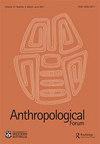Revisiting Power in a Southeast Asian Landscape – Discussant’s Comments
IF 0.7
3区 社会学
Q3 ANTHROPOLOGY
引用次数: 4
Abstract
ABSTRACT Going back a half century to the classic essays of Benedict Anderson (‘The Idea of Power in Javanese Culture’) and Lucien Hanks (‘Merit and Power in the Thai Social Order’) shows both the value and the limitations of anthropology’s move to meaning and increasingly intensive, site-specific fieldwork. While Anderson and Hanks pioneered the study of indigenous meanings, an approach which came to dominate Southeast Asian anthropology and area studies, they did so from a broadly comparative regional perspective unlike today’s culture-specific approach and its stand-alone ethnographies. Their breadth suggests why Anderson and Hanks’s insights into just two cultures have enlightened research all across the region and beyond. Here, to build on their work, our analysis suggests Javanese and Thai notions of power are variations on a regional complex wherein Southeast Asians domesticate power to lead a safe, prosperous and moral life in an otherwise dangerous and amoral world. More broadly, Anderson and Hanks’s essays exemplify how a regional perspective can help us improve as fieldworkers and advance as theorists. In the end, better ethnography will require better ethnology and area studies.在东南亚景观中重新审视权力-讨论者评论
回顾半个世纪以来本尼迪克特·安德森(《爪哇文化中的权力观念》)和吕西安·汉克斯(《泰国社会秩序中的美德和权力》)的经典论文,我们可以看到人类学转向意义和日益密集的、特定地点的田野调查的价值和局限性。虽然安德森和汉克斯是土著意义研究的先驱,这种研究方法后来在东南亚人类学和区域研究中占主导地位,但他们是从一个广泛的比较区域角度进行研究的,而不是像今天的文化特定方法和独立的民族志。它们的广度说明了为什么安德森和汉克斯对两种文化的洞察启发了整个地区乃至其他地区的研究。在此,基于他们的研究成果,我们的分析表明爪哇人和泰国人对权力的概念是一种区域综合体的变体,在这种综合体中,东南亚人驯化权力,以便在一个危险和不道德的世界中过上安全、繁荣和道德的生活。更广泛地说,安德森和汉克斯的文章举例说明了地域视角如何帮助我们作为实地工作者获得进步,作为理论家获得进步。最后,更好的人种学需要更好的人种学和地区研究。
本文章由计算机程序翻译,如有差异,请以英文原文为准。
求助全文
约1分钟内获得全文
求助全文
来源期刊

Anthropological Forum
ANTHROPOLOGY-
CiteScore
3.60
自引率
10.00%
发文量
14
期刊介绍:
Anthropological Forum is a journal of social anthropology and comparative sociology that was founded in 1963 and has a distinguished publication history. The journal provides a forum for both established and innovative approaches to anthropological research. A special section devoted to contributions on applied anthropology appears periodically. The editors are especially keen to publish new approaches based on ethnographic and theoretical work in the journal"s established areas of strength: Australian culture and society, Aboriginal Australia, Southeast Asia and the Pacific.
 求助内容:
求助内容: 应助结果提醒方式:
应助结果提醒方式:


